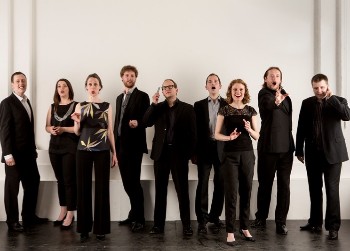
“Since its beginnings in the first decades of the 16th century the madrigal had always been a forward-looking genre” – these words were written by James Weeks, the director of EXAUDI, in the programme notes for their concert, given as part of the Musicon series and the 2019 Durham Vocal Festival. EXAUDI’s programme not only led us through the developments of the madrigal in the late Renaissance, but also illustrated how the genre continues to inspire composers today.
Like their lighter English namesakes, Italian madrigals have a strong association with the natural world. EXAUDI began at the lighter end of the spectrum, with settings of texts that link the natural world to the feelings of the human heart. Vezzosi augelli by Giaches de Wert was delightfully light and breezy, and in the start of Monteverdi’s Ecco mormorar l’onde that followed, the lower voices went down to a near whisper before gradually building up to full, clear tones. Continuing the pastoral theme, Monteverdi’s Io mi son giovinetta at the end of the first half was filled with rapid and precise runs, and in the rhythmic bounce there was a strong sense that they were singing this purely for pleasure.
James Weeks and EXAUDI are ensuring that the madrigal genre continues to look forwards by regularly performing contemporary madrigals, and commissioning composers to contribute to the “EXAUDI New Italian Madrigal Book”. The new music tonight came from Salvatore Sciarrino’s settings of haiku by Matsuo Bashō – O Lodola (O Lark), La cicala! (The Cicada) and Rosso, così rosso (Red, so very red). These were clearly extremely demanding to sing, requiring unusual tuning and colourful vocalisations, but they were also very attractive pieces to listen to. The eerie high tones of soprano Juliet Fraser and mezzo Lucy Goddard suggested expansive moorlands, with a lark fluttering somewhere high above. The cicadas were depicted with descending trills, and rhythmic throat sounds, and the fleeting scraps of sound in the last of the three brought to mind the scurrying of autumn leaves in the wind.
Of course, madrigals with adventurous harmonies are nothing new: Carlo Gesualdo was pushing and experimenting with tonality back at the end of the sixteenth century, and here we turned away from the pastoral towards the very human themes of love and death that are never far from Gesualdo’s work. In the anguished harmonies of Mercè grido piangendo, the five singers were as dark and still as the grave, but at every mention of death, the singing was charged with eroticism. Similarly Io pur respiro was deeply sensual and expressive, before finding some sort of calm at the end.
In introducing Eric Egan’s Un libro ravvolge, commissioned by EXAUDI and receiving its first performance this evening, James Weeks talked first about how Gesualdo’s harmonic language may have been influenced by musicians he met in Ferrara who were experimenting with an alternative tuning system, in which each tone was divided not into two semitones but into five, giving 31 notes between octaves. Egan too is experimenting with other ways to organise pitch, and if fifth-tones sound radical, well Un libro ravvolge requires the singers to tune within a 100th of a semitone. Egan’s programme note explains that his system is built up from a base frequency that corresponds to the electromagnetic waves that resonate between the ground and the upper atmosphere when lightning strikes: perhaps imagine a string stretched between heaven and earth, then plucked. It all sounds terribly esoteric, but as with anything, the proof is in the eating, and the effect was of a pure, ethereal harmony, that was very easy on the ear. I have no way of judging how accurately EXAUDI sang, other than the fact that the result was pleasing, so it was probably right. The piece itself consisted of fifteen little fragments of sound, stretching the singers to the limits of their ranges: Jimmy Holliday’s bass towards the end almost disappeared off the audible scale. Unfortunately the text, by the anti-fascist poet Virginia d’Andrea wasn’t made available to us, presumably for copyright reasons, and it was also bad luck for us all that there was a lot of external noise during this piece: it would be good to hear it again in a soundproof room to appreciate more of its detail.
The remainder of the programme showed how madrigal writers started to experiment with presenting direct speech and dialogue, in ways that contributed to eventual development of opera. Marenzio’s Solo et pensoso sets a beautiful reflection on love by Petrarch: the poet wants to hide from everyone and escape to the wild mountains, but however rough the path that he chooses, love remains by his side. EXAUDI emphasised the speaker’s introversion, fading to a gentle lyricism for the part about woods and mountains, and ending sweetly. To close, we were treated to one of Monteverdi’s best-known early madrigals: Riminate in Pace, again characterised by great stillness as EXAUDI spun out the vocal lines in quiet sadness and left me wanting to sit peacefully, momentarily oblivious to all of life’s complications and distractions.








